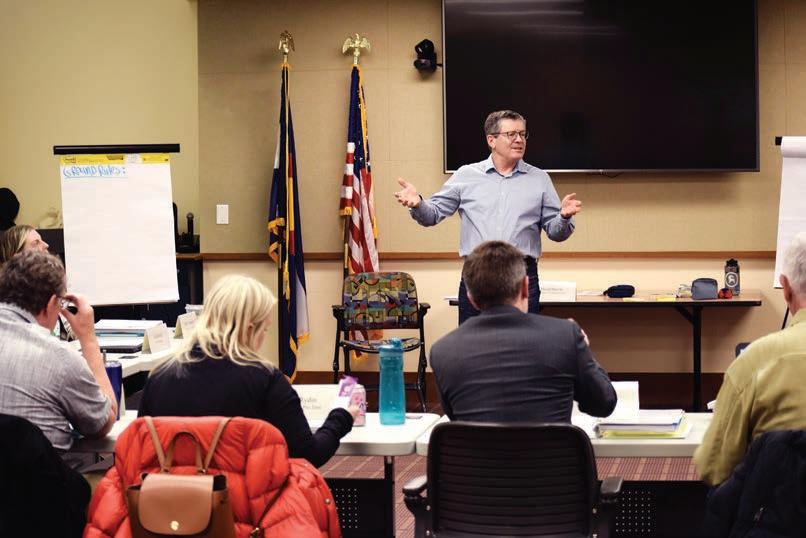
5 minute read
Littleton city leadership attends annual retreat
Priorities, goals discussed
BY NINA JOSS NJOSS@COLORADOCOMMUNITYMEDIA.COM
In a conference room at the Littleton Museum, twelve members of city leadership stood in a circle and called out ideas for a man at the front of the room to write on a giant notepad.
is is how the annual Littleton city council retreat started on Feb. 10, kicking o a day and a half of conversations, re ection and goalsetting for city councilmembers and sta .

“ is weekend, today and tomorrow, are really important,” City Manager Jim Becklenberg said to the group. “My job is to help to facilitate the council’s alignment around goals, and then to articulate and make that alignment and those priorities clear for sta … I think this is a great opportunity here.”

Goals & accomplishments
David Marvin, a leadership consultant from Con uence Leadership Group led the event. To start o , he asked councilmembers and sta to share goals for the retreat.
Mayor Kyle Schlachter said one of his hopes for the weekend was “council ownership over the direction of the city.”
Assistant City Manager Samma Fox said she was hoping for clarity and strategic planning for future and immediate priorities.
During another activity, retreat participants re ected on accomplishments from 2022. Among dozens of successes, they listed e Tri-Cities Homeless Action Plan, Downtown Development Authority, inclusionary housing ordinance and hiring Becklenberg as a new city manager as some of their proudest accomplishments.
Public participation
Later in the afternoon, the group discussed the potential of allow- ing virtual public comment during council meetings. Currently, the city has an online comment form where community members can share their thoughts with council if they are not able to come to a meeting in person.
District 3 Councilmember Stephen Barr introduced the idea of having a version of public comment where people can call in during meetings and speak live.
“I feel that there’s kind of a missing element… of participation on a regu- lar meeting in being able to make public comment for those that quite honestly don’t have the mobility, the time, space in their lives -- or even just honestly the internal gumption to get up and speak in front of people, which can be terrifying for some folks,” he said. “I think this is an avenue that we could increase that public participation in a meaningful way.”
All seven members of council expressed general agreement that call-in public comment would be a good idea to explore, but some had concerns that virtual participation could overwhelm meetings.
City Attorney Reid Betzing mentioned a recent public meeting in a nearby municipality where there were hours of public comment from callers from around the country. He said a topic on the agenda had made its way to an online forum and inspired national participation.
Schlachter acknowledged that call-in public comment has pros and cons, as it makes public commenting more accessible but also runs the risk of a situation like the one Betzing mentioned. Council and sta spoke about possible ways to keep virtual public comment under control, including time limits for commenting periods.
City sta will explore the idea and the logistics of virtual public comment in terms of labor, time and sta ng.
City priorities e theme for the second day of the retreat was “creating alignment and focus for this year’s priorities,” according to the retreat agenda.
“Most of Saturday was spent trying to ensure alignment from the vision that the community set in the Envision Littleton process a couple years ago with the day-to-day work that we do,” Becklenberg said in an interview with CCM. “(Council) wanted to make sure that their priorities and the work that sta is doing is furthering the goals from that process.”
Schlachter said the council focused on ve outcomes in this area: vibrant community with rich culture, sustainable community with natural beauty, robust and resilient economy, safe community and high quality governance.
“ ose were the outcomes that we see the community striving for,” he said. “And then we as a group, the council, had discussions on what our speci c priorities in the coming one to three years are, and that’s what we wanted sta to have more of their focus on.”
In order of importance, the speci c priorities included: housing, safety, economic development, infrastructure and environment.
“Housing is very important to council because it, as we see, is a regional wide issue,” Schlachter said in an interview with CCM. “We need to be doing our part to help address the housing issue, we can’t just assume other communities are doing things.”
Schlachter said the group discussed revisiting the Universal Land Use Code to see if it could be adjusted to further address issues in housing, speci cally by looking at regulations for accessory dwelling units in the city.
Within the other priorities, he said the group discussed lowering crime rates, helping businesses thrive, enhancing infrastructure for cyclists and pedestrians and potentially exploring a single hauler trash system.
Potential future ballot questions

Council and sta also discussed several potential ballot questions for the November 2023 election, Schlachter said.
One was related to a marijuana tax increase. Council directed sta to explore the idea and potentially do preliminary polling on the question before council decides whether or not to go forward with it.


“We want to do some more re- search on tax rates in our area,” Becklenberg said about next steps for this potential ballot item. “We also just want to make sure we are careful with the language and that we understand the policy implications of whatever language is put forward there.” e other ballot question council wanted sta to explore was regarding Senate Bill 05-152, which excludes local governments from entering into the broadband market, according to the Colorado Municipal League. Council’s potential ballot question on this topic would ask voters if they want Littleton to opt out of this rule.

“At this point, that topic and a ballot measure like that would be fairly standard because so many communities in the state have already taken that step to exempt themselves from the state law,” Becklenberg said. “We would want to make sure that we are drafting that language in a way that is technically correct to have the
impact that we hope to have.”
Leadership lessons
Outside of strategic goal-setting, the retreat also helped city councilmembers to focus on how they communicate and work together. Marvin, the leadership consultant, gave feedback and helped councilmembers re ect on ways they cooperate.

“Leadership is critical for moving initiatives forward for creating a real clear vision,” Marvin said in an interview with CCM.
One piece of advice he gave council members was to focus on a “both, and” mentality instead of thinking things have to be one way or another. is and other advice helped council to re ect on the ways they work together, which Becklenberg said were already strong.
“ e way the council works together, or doesn’t, is a big factor in just the morale and frankly, people wanting to continue to work here,” Becklenberg said to the group. “I know that kind of ebbs and ows over time, but it really can’t be understated when people who might not agree with each other inherently, the way that this group works together respectfully, has a vote and can move on.” e retreat, in his eyes, was a great way to enhance that even more.
“I was grateful that the city council would take the time to step back from the day-to-day issues that they deal with and spend some time thinking about longer term priorities for the for the city, and also spending a few minutes talking about how they work together and how that can be strengthened even more,” he said.
$AVE $2,00000




